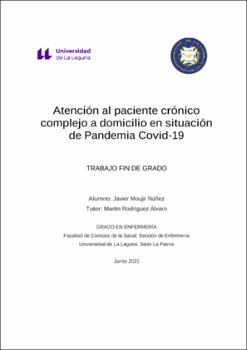Atención al paciente crónico complejo a domicilio en situación de pandemia COVID-19
Author
Moujir Núñez, JavierDate
2022Abstract
El incremento de la cronicidad y el envejecimiento poblacional, junto con la
pandemia por el virus SARS-Cov-2, constituyen un reto para los Servicios Sanitarios de
Salud a nivel nacional y autonómico. El fin es ofertar una atención de calidad basada en un
modelo asistencial proactivo, continuo e integrado, centrado en el paciente y el cuidador.En
este trabajo se lleva a cabo una revisión narrativa con el objetivo de analizar el papel de la
enfermería de enlace en la atención del paciente crónico complejo en domicilio, donde tiene
lugar la mayoría de los cuidados y se desarrolla la atención sociosanitaria de forma
coordinada, simultánea y estable, ajustada al principio de continuidad de la atención.
Además, identificar las principales características de la tele-enfermería, como una
nueva estrategia de relación entre el personal sanitario y el paciente. Así mismo revisar las
estrategias anti-Covid, dirigidas a la prevención y disminución de la transmisión del virus
SARS-Cov-2 y con ello la protección de la salud de los pacientes de mayor riesgo y
complejidad The increase in chronicity and the aging of the population, together with the
pandemic caused by the SARS-Cov-2 virus, constitute a challenge for the Health Services
at the national and regional level. The aim is to offer quality care based on a proactive,
continuous and integrated care model, centered on the patient and the caregiver. This work
carry out a journalistic literature review whose objective is to analyze the role of liaison
nursing in the care of complex chronic patients at home, where most of the care takes place
and the social health care is developed in a coordinated, simultaneous and stable way,
adjusted to the principle of continuity of care.
In addition, to identify the main characteristics of tele-nursing, as a new relationship
strategy between health personnel and the patient. Likewise, review the anti-Covid
strategies, aimed at preventing and reducing the transmission of the SARS-Cov-2 virus and
thereby protecting the health of patients at higher risk and complexity.





